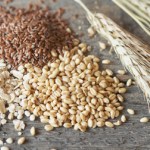International Agricultural Development
Tomorrows Table: What does GMO really mean?
For years, journalists, television producers and newspaper reporters that write about genetically engineered crops, have used the term “GMO” (genetically modified organism) to describe these new crop varieties. The marketing industry has taken to writing “GMO-free” on their products, as a way to increase sales to consumers fearful of the genetic engineering process.The problem is that the term GMO is misused and misunderstood.Take, for example, a recent story on Voice of America about a newly developed rice variety that is…
This week, the G20 Agriculture Ministers gathered for their first-ever meeting to discuss potential measures to address price volatility and record high food prices. The key to any long-term solution is acknowledging that we need to empower the very people whose lives are most affected by food shortages. Three-quarters of the world's poorest people get their food and income by farming small plots of land. The potential of small farmers for getting us out of this and future food crises cannot be overstated.
Today, we find that millions of lives depend upon the extent to which agricultural…
One more day to vote in the , which asks the question "Is Biotechnology compatible with sustainable agriculture?"
PZ Myers answers the question this way: "this is weird: agriculture is biotechnology, and just breaking ground with a sharp stick and throwing some seeds in is an example of an 'unnatural' human practice"
He also publishes the opposition's "top secret email", which has some gobbledy-gook about how farmers are turning against GE crops (um, name one?) and contaminating nature (massive reductions in insecticide use on BT cotton fields and enhanced biodiversity is destruction?). PZ…
The World Science Festival, is a five day-long extravaganza of science in New York City that is coming up this year on June 2-6. The World Science Festival (now in it's third year) is not only for adults interested in science society- it is for kids, too. That why I will bring my 9 year old daughter with me. She is clamouring for high heels to wear to the opening night gala honoring Stephen Hawking. On Sunday, the heels will come off for some fun at the Festival Street Fair, featuring Discovery Theater and Author's Alley.
On Friday evening, I will participate in a panel called Food 2.0:…
This Op-Ed just published today in the NY TImes.
Here it is with links and a few edits.
A REPORT by the National Research Council last month gave ammunition to both sides in the debate over the cultivation of genetically engineered crops. More than 80 percent of the corn, soybeans and cotton grown in the United States is genetically engineered, and the report details the "long and impressive list of benefits" that has come from these crops, including improved soil quality, reduced erosion and reduced insecticide use.
It also confirmed predictions that widespread cultivation of these crops…
Check out this great post by Mary M on biofortifed. In it she reviews a new research paper that describes how the use of Bt could potentially save the lives of millions.
You can download a video about the researchers and their work here.
From Mary's post: "For some people, a great deal of the conflama around genetically-engineered (GE) crops has to do with the presence of a pesticide in the plant material--mainly the Bacillus thuringiensis or Bt protein--rather than coating the surface of the plant as organic Bt sprays or chemical-style pesticides would. No matter how many times I explain…
Thank you Bill Gates for your work on behalf of farmers and.... for blogging on our book, Tomorrow's Table!
If you don't have time to read the full reviews, here are a few excerpts:
"This is an important book for anyone who wants to learn about the science of seeds and the challenges faced by farmers... I think anyone who reads this book will be convinced of the authors' sincerity and intelligence - even if, like me, you never try any of the cool-sounding recipes...
I gained an understanding of the history of organic farming and learned about some of the very clever ways organic farmers…
Read Emily Waltz' interview with Roger Beachy, the new director for the National Institute of Food and Agriculture (NIFA), the new research funding arm of the US Department of Agriculture (USDA).
What does Beachy's appoinment mean for researchers, farmers and consumers?
Larger, longer grants with more money for education or extension, so the knowledge can reach from the lab to the food to the fork; a stonger focus on sustinable approaches; and a regulatory stucture that is science based
We need to build enhanced capacity in the US to address urgent agricultural challenges such as sustainable…
In an interview with The Times, Gordon Conway, Professor of International Development at Imperial College London and a former government adviser said that the ban on organic farmers using GM crops was based on an excessively rigid rejection of synthetic approaches to farming and a misconception that natural ways were safer and more environment- friendly than man-made ones.
I completely agree with Gordon Conway that it makes sense for farmers to use the most powerful tools available to make their production more sustainable. Still, I think it unlikely in the short term that organic farmers…
The word is spreading- we can feed the world without damaging it, if we can entertain some new ideas.
Check out Paul Voosen's article in the NYT and let me know what you think.
An article in the Harvard International Review by Paul Collier paints a stark view of African peasantry. Collier presents a convincing argument that for African agriculture to become more productive, it needs modern agricultural technologies and new modes of organization
(Thanks to Eric Ward for alerting me to this article).
"The poverty of African peasants is not accidental: it is intrinsic to the peasant mode of economic organization. The very features that make the peasant mode of production appear attractive to jaded members of an industrialized society also make it unproductive. Large…

